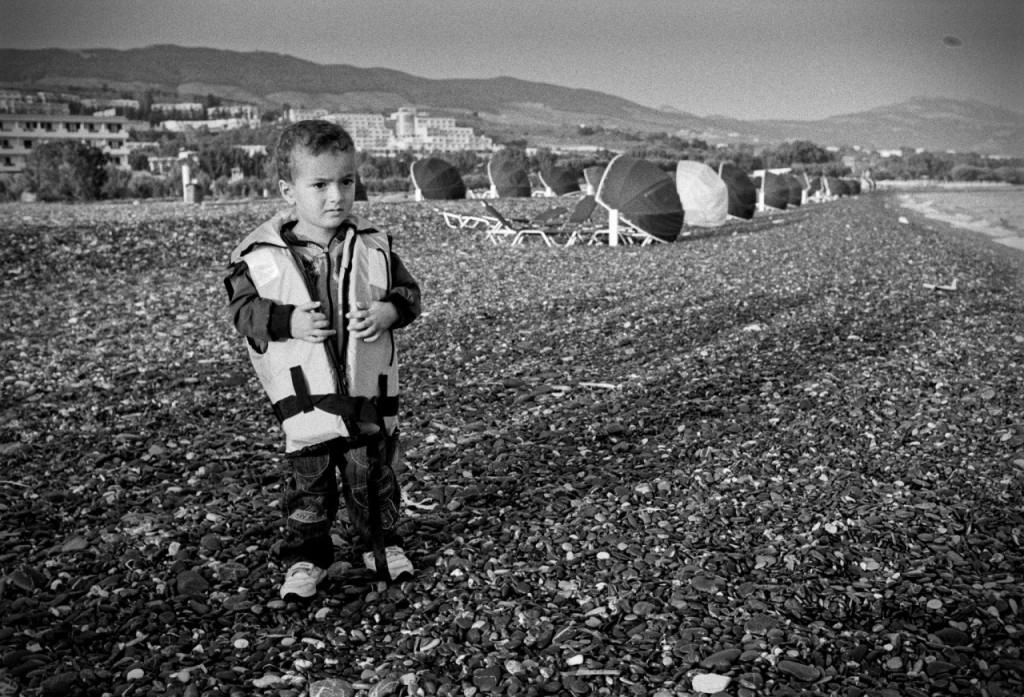The following post was contributed by Annika Roes, who is currently in Izmir, Turkey, where she is volunteering with a refugee support group. Annika interned with the Metta Center last April.
It is a Tuesday night, and it is already a bit late when the doorbell rings. Another five people have come to join the Volunteers of Izmir.
The room is already full of people and there are no chairs left—but the newcomers are greeted and five glasses of steaming tea are quickly filled. Then there is a clap from one side of the room. “Guys, back to order! Let’s plan what we’ll do this week. So we’ll have three groups for Wednesday…” The Volunteers of Izmir that now fill up that room are a group of Turkish and international people who only assembled themselves a few weeks ago to help the refugees in Izmir. Every week, more people join the volunteers, and more people receive help.
 Caption: A refugee child still wears his life vest after safely reaching the beach of Kos, Greece. Photo courtesy of Okke Ornstein
Caption: A refugee child still wears his life vest after safely reaching the beach of Kos, Greece. Photo courtesy of Okke Ornstein
Izmir is in the West of Turkey, on the Aegean coast, and it is a summer tourist destination that has become a center of departure for refugees from places like Syria, Iraq, and Afghanistan, all of whom seek to reach Europe. In the center of Basmane, groups of people wearing backpacks prepare to cross the dangerous passage of sea between the Turkish coast and the Greek Islands.
Just this week a refugee boat sank and 12 people died—people who were walking the same streets in Izmir as I have been. With the volunteer group, I have visited families who would like to take the hard passage way as well. They do not receive any help from the state, and they go out of their way to make life as normal as possible. But in the long run, many do not see a future in Turkey, where refugees are welcomed as exploitable workers.
I sometimes feel frustrated with and numbed by the situation. Yet the willingness of the volunteers to stay and the encounters with the refugees give me hope. There is humanity that works, that makes people reach out to each other and to give support for each other.
There are so many stories worth sharing! Like the one about a woman who roams the markets to buy winter shoes, socks, and jackets for some of the poorest refugee families.
Then there’s the pregnant woman who was due to give birth and didn’t have the required ID card to qualify for medical aid. A few days later, one of the volunteers joyful waved at me: “Come, do you wanna see our new baby?” By insisting, and indulgently trying to find a solution for the woman, the group had really changed the starting conditions for the new born and his mother. And the next day, others brought clothes and diapers, together with a bag of food.
Once, a woman from Syria told me about a new mascara that doesn’t smear, and as she applied some of it to my eyelashes, she invited me to visit her home. She gave me the mascara as a present and we exchanged numbers.
And there’s the seven year-old boy who was very angry and had changed. He didn’t want to go to school because he didn’t understand anything or know anyone. Nothing was like it was at home. That’s why he was aggressive. But the last time I saw him, he was hugging his sister.
The hostel owners who at the first call, open their houses so that we can do a kids activity… The huge dinner that one of the refugee families cooks for the volunteers… All these stories are just as real as the sad ones.
You may also be interested in the Winter 2015/2016 issue of Emergence, which features pieces about the plight of the refugees seeking haven in Europe.








